New HVAC System Cost Estimator
A new HVAC (Heating, Ventilation, and Air Conditioning) system is a significant investment for any property, offering comfort, energy efficiency, and improved indoor air quality. Whether you’re installing a new system in a residential home, a commercial building, or an industrial facility, understanding the costs involved is crucial for effective budgeting and planning. Estimate Florida Consulting provides expert cost estimator services to help you plan and execute your HVAC system installation with precision, ensuring that your project stays within budget while delivering optimal performance and efficiency.
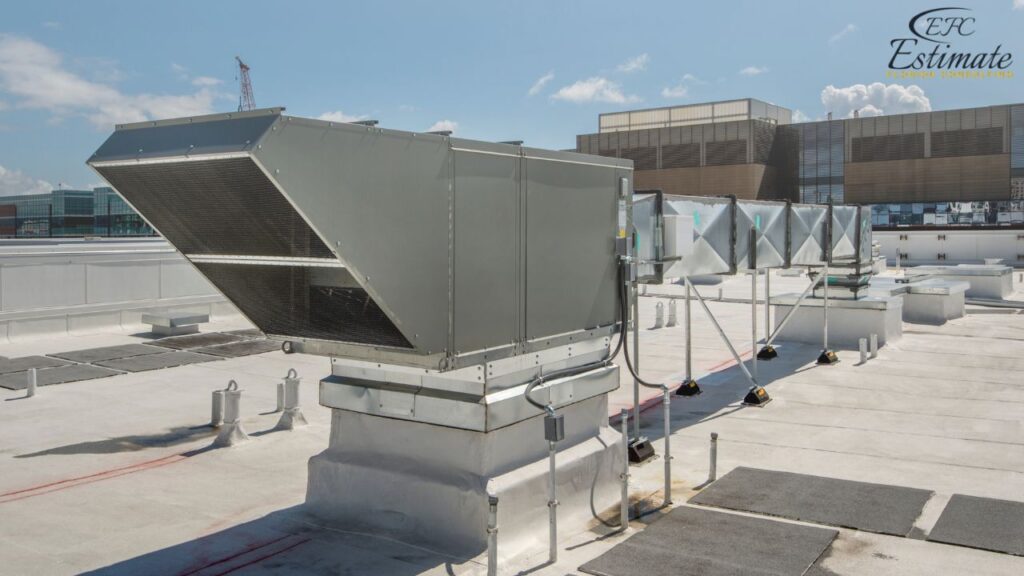
How Much Does a New HVAC System Cost?
The cost of a new HVAC system can vary depending on several factors, including the type of system, the size of the property, the complexity of the installation, and the specific features you choose. On average, a new HVAC system can cost between $5,000 to $20,000, including equipment and installation. Understanding these costs is essential for effective budgeting and planning, ensuring that your project stays within financial constraints while achieving the desired results. Planning a new HVAC system? Estimate your HVAC installation costs to budget for units, ductwork, and labor.
HVAC System Costs by Property Size and Scope
Here’s a breakdown of estimated HVAC system costs by property size, providing you with a clear understanding of how different project sizes impact overall costs:
Property Size (Square Feet) | Estimated HVAC System Cost per Square Foot | Total Cost Range |
1,000 square feet | $5 – $15 | $5,000 – $15,000 |
2,500 square feet | $6 – $16 | $15,000 – $40,000 |
5,000 square feet | $7 – $18 | $35,000 – $90,000 |
10,000 square feet | $8 – $20 | $80,000 – $200,000 |
HVAC System Cost by Type
The cost of a new HVAC system can vary widely depending on the type of system you choose. Each type of HVAC system comes with its own set of features, efficiency levels, and installation complexities, all of which contribute to the overall price. By understanding the differences between these systems, you can select the one that best fits your climate, home size, and comfort requirements.
HVAC System Type | Price per Unit (Material Only) | Price per Unit (Installed) |
Central Air Conditioning (AC) | $3,000 – $6,000 | $5,000 – $9,000 |
Heat Pump | $4,000 – $8,000 | $6,500 – $12,000 |
Ductless Mini-Split System | $2,500 – $5,500 | $4,000 – $8,500 |
Furnace | $2,500 – $7,500 | $4,000 – $10,000 |
Boiler | $3,500 – $7,000 | $6,000 – $12,000 |
Geothermal Heat Pump | $10,000 – $25,000 | $15,000 – $40,000 |
Central Air Conditioning (AC):
Central air conditioning systems are the most common HVAC solutions for cooling large homes or commercial buildings. These systems work by circulating cooled air through a network of ducts, ensuring consistent temperature control throughout the entire space. The cost of a central AC unit typically ranges from $3,000 to $6,000 for the equipment alone, with installation costs ranging from $5,000 to $9,000. Installation may involve additional work, such as ductwork adjustments, electrical upgrades, and thermostat integration.
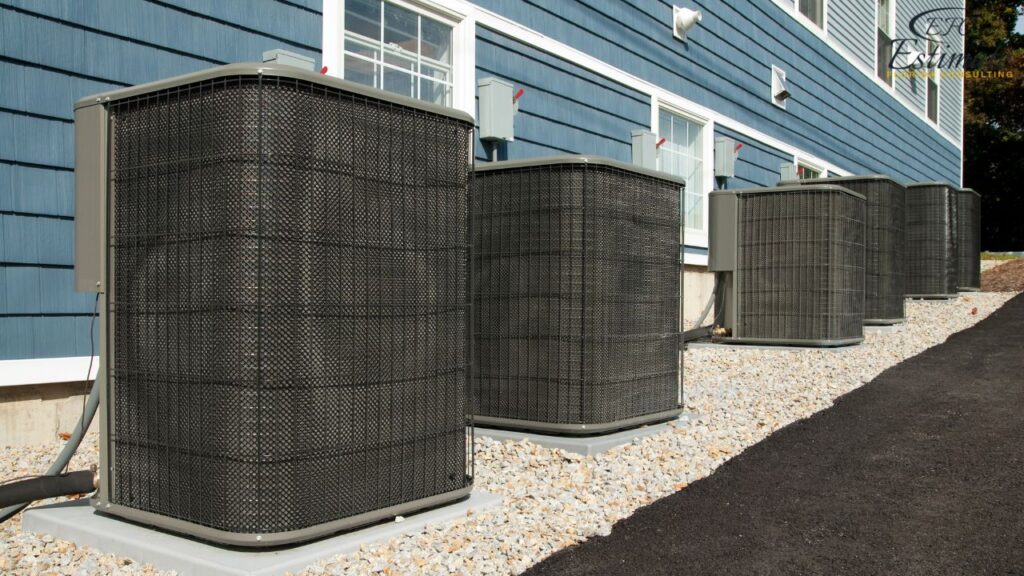
Central AC systems are highly efficient at cooling large areas and can be seamlessly paired with a furnace to provide comprehensive year-round climate control, making them a popular choice in regions with hot summers.
Heat Pump:
Heat pumps are versatile HVAC systems that provide both heating and cooling by transferring heat between the indoors and outdoors. Unlike traditional heating systems that generate heat, heat pumps move heat, making them more energy-efficient, especially in moderate climates. The cost of a heat pump typically ranges from $4,000 to $8,000 for the unit, with installation costs between $6,500 and $12,000. Installation complexity can vary depending on whether the system is ducted or ductless, and whether additional components like backup heating elements are required. Heat pumps are particularly attractive for their ability to provide consistent, comfortable temperatures year-round while reducing energy consumption, especially in regions where winters are mild.
Ductless Mini-Split System:
Ductless mini-split systems offer a flexible solution for zoned heating and cooling without the need for ductwork. These systems consist of an outdoor compressor and one or more indoor air-handling units, each serving a specific room or area. The cost of a ductless mini-split system ranges from $2,500 to $5,500 per unit, with installation costs ranging from $4,000 to $8,500. The installation process is generally less invasive than ducted systems, as it only requires a small hole in the wall for the conduit. Ductless mini-split systems are ideal for homes without existing ductwork, room additions, or spaces where precise temperature control is desired, such as home offices or master bedrooms. Additionally, these systems are known for their quiet operation and energy efficiency, making them a popular choice for both residential and commercial applications.
Furnace:
Furnaces are the most common heating systems in colder climates, using natural gas, oil, or electricity to generate heat that is distributed throughout the home via ductwork. The cost of a furnace typically ranges from $2,500 to $7,500 for the unit, with installation costs between $4,000 and $10,000. The installation process may involve significant work, such as connecting to gas lines, venting, and integrating with an existing AC system for combined HVAC solutions. Furnaces are known for their ability to provide powerful and consistent heating even during the coldest winter months, making them a reliable choice for regions with harsh winters. High-efficiency furnaces, which convert a higher percentage of fuel into usable heat, may come at a premium but offer long-term savings on energy bills.
Boiler:
Boilers heat water to provide radiant heating through baseboards, radiators, or underfloor heating systems. Unlike furnaces, which heat air, boilers distribute heat through hot water or steam, offering a more even and comfortable warmth. The cost of a boiler typically ranges from $3,500 to $7,000 for the unit, with installation costs ranging from $6,000 to $12,000. Boilers are often chosen for their efficiency and the comfort they provide, particularly in homes with radiant floor heating systems. Installation may require additional components, such as expansion tanks, pumps, and controls, which can add to the overall cost.
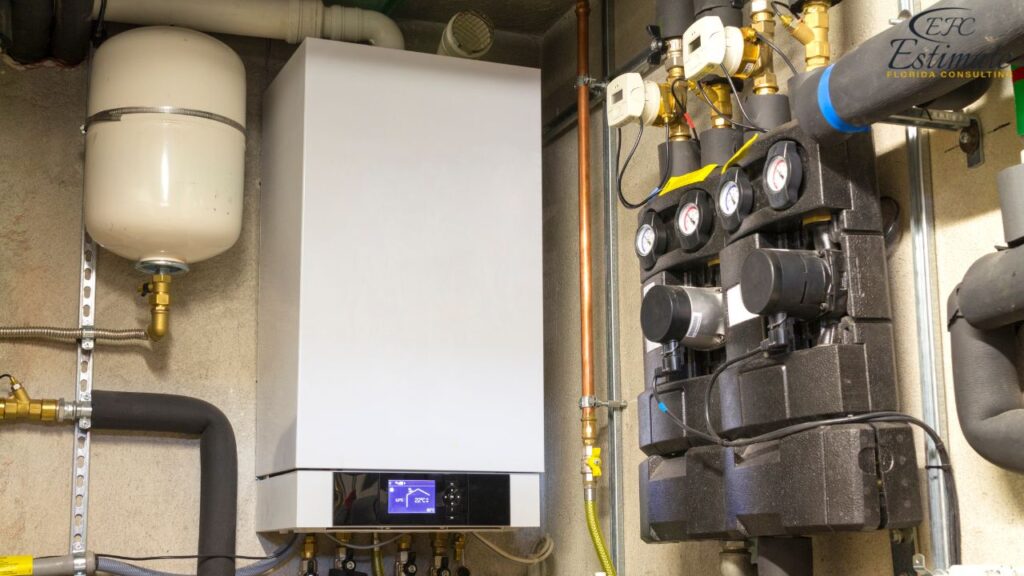
Boilers are a popular choice in older homes or buildings with existing radiator systems and are known for their longevity and reliable performance.
Geothermal Heat Pump:
Geothermal heat pumps are among the most energy-efficient and environmentally friendly HVAC options available. These systems utilize the stable temperature of the earth to heat and cool your home, significantly reducing energy consumption compared to conventional systems. The cost of a geothermal heat pump typically ranges from $10,000 to $25,000 for the system, with installation costs ranging from $15,000 to $40,000. Installation involves drilling or excavating to install the underground loop system, which can be a complex and costly process depending on the soil conditions and the size of the property. Despite the high upfront costs, geothermal systems offer substantial long-term savings on energy bills and often qualify for government incentives and rebates. They are an excellent choice for homeowners looking to invest in a sustainable, long-term HVAC solution with minimal environmental impact.
HVAC Videos
HVAC Installation
HVAC & Plumbing
HVAC
HVAC System Cost by Project Type
The cost of a new HVAC system can also vary depending on the scope and complexity of the project. Whether you’re installing a new system, replacing an old one, or upgrading specific components, each project type presents its own set of challenges and costs that need to be considered.
Project Type | Cost Range |
New HVAC System Installation | $6,000 – $20,000 |
HVAC System Replacement | $5,000 – $15,000 |
HVAC System Upgrade | $4,000 – $12,000 |
Ductwork Installation/Repair | $3,000 – $8,000 |
Thermostat Installation | $200 – $800 |
New HVAC System Installation:
Installing a new HVAC system is a major project that typically costs between $6,000 and $20,000. This price range reflects the cost of the equipment, labor, and any additional work required, such as installing ductwork, upgrading electrical systems, or modifying structural elements to accommodate the new system. New installations are often more complex because they require careful planning and coordination with other trades, such as electricians and carpenters, to ensure everything is correctly integrated. Factors such as the size of your home, the type of HVAC system, and the local climate will also influence the overall cost. For new constructions or major renovations, investing in a high-quality, energy-efficient HVAC system can add significant value to your property and provide long-term comfort and savings.
HVAC System Replacement:
Replacing an old, inefficient, or malfunctioning HVAC system typically costs between $5,000 and $15,000. This price includes removing and disposing of the old system, installing the new unit, and any necessary upgrades to ductwork or electrical connections. Replacement costs are generally lower than new installations because the existing infrastructure, such as ductwork and electrical wiring, can often be reused. However, if your current system is outdated or improperly sized, additional modifications may be required to ensure the new system operates efficiently. Replacing an aging HVAC system with a modern, energy-efficient model can significantly reduce energy bills, improve indoor air quality, and increase overall comfort.
HVAC System Upgrade:
Upgrading an existing HVAC system can involve adding new components, such as a heat pump, upgrading to a high-efficiency model, or integrating smart controls for better temperature management. HVAC system upgrades typically cost between $4,000 and $12,000. Upgrades can be an excellent way to enhance the performance of your existing system, extend its lifespan, and improve energy efficiency without the need for a complete replacement. Common upgrades include installing variable-speed motors, upgrading to a programmable or smart thermostat, or adding zoning systems to control different areas of your home independently. These improvements can lead to lower energy consumption, reduced utility bills, and a more comfortable living environment.
Ductwork Installation/Repair:
Proper ductwork is essential for distributing conditioned air throughout your home efficiently. If your home requires new ductwork or repairs to existing ducts, you can expect to pay between $3,000 and $8,000. This cost covers the materials and labor required to install or repair ducts, ensuring that your HVAC system can deliver air evenly to every room. Poorly installed or damaged ductwork can lead to uneven heating and cooling, increased energy bills, and poor indoor air quality. Investing in high-quality ductwork installation or repair is crucial for maximizing the efficiency and effectiveness of your HVAC system.
Thermostat Installation:
A thermostat is the control center of your HVAC system, allowing you to regulate temperature settings and optimize energy use. Installing a new thermostat, particularly a smart thermostat, typically costs between $200 and $800. Smart thermostats offer advanced features, such as remote control via smartphone apps, learning algorithms that adapt to your schedule, and energy usage reports. These features can help you save on energy costs by optimizing your HVAC system’s performance. Installing a smart thermostat is a relatively simple and cost-effective upgrade that can significantly enhance the convenience and efficiency of your HVAC system.
Estimating the Total Cost: A Detailed Example for a 2,000 Sq.Ft. Home with a Central Air System
To provide a clearer understanding of what to expect, here’s an example of estimating the cost for installing a central air system in a 2,000-square-foot home, including labor, ductwork, and additional features.
- Central Air System: $4,500 – $10,000
- Labor (Professional Installation): $1,500 – $3,500
- Ductwork (If Needed): $2,500 – $5,000
- Smart Thermostat: $150 – $500
- System Upgrades: $500 – $2,000
Cost Component | Low Estimate | High Estimate |
Central Air System | $4,500 | $10,000 |
Professional Labor | $1,500 | $3,500 |
Ductwork | $2,500 | $5,000 |
Smart Thermostat | $150 | $500 |
System Upgrades | $500 | $2,000 |
Total Estimated Cost | $9,150 | $21,000 |
This example demonstrates how various components contribute to the overall cost of your HVAC installation project. By understanding these costs, you can better plan your budget and ensure that all aspects of the project are covered, leading to a successful and satisfying result. Proper planning also helps you avoid unexpected expenses, ensuring that your project stays within budget. The detailed breakdown provides transparency and allows you to see exactly where your money is being spent, helping you make informed decisions throughout the process.
Additional Costs and Considerations
Several other factors can influence the total cost of your HVAC system installation or replacement. These include energy efficiency upgrades, permits, zoning systems, and ongoing maintenance, all of which contribute to the overall cost and long-term performance of your system.
Additional Cost | Estimated Cost |
Energy Efficiency Upgrades | $1,000 – $5,000 |
Permits and Inspection Fees | $200 – $1,500 |
Zoning Systems | $2,000 – $5,000 |
Annual Maintenance Plan | $150 – $500 per year |
Air Quality Improvements (Filters, UV Lights) | $500 – $2,500 |
Energy Efficiency Upgrades:
Investing in energy efficiency upgrades for your HVAC system can lead to significant long-term savings on utility bills and reduce your environmental impact. Upgrades such as high-efficiency filters, energy recovery ventilators, and variable-speed motors typically cost between $1,000 and $5,000. These upgrades not only improve the efficiency of your HVAC system but also enhance indoor air quality, reduce wear and tear on the system, and lower overall energy consumption. For homeowners focused on sustainability and long-term cost savings, energy efficiency upgrades are a smart investment that can pay off over time.
Permits and Inspection Fees:
Depending on your location, you may be required to obtain permits and undergo inspections for your HVAC installation. These permits ensure that the installation meets local building codes and safety standards, and the associated fees typically range from $200 to $1,500. It’s important to work with a licensed HVAC contractor who understands local regulations and can handle the permitting process on your behalf. Failing to obtain the necessary permits can result in fines, delays, or issues with home insurance and resale value.
Zoning Systems:
A zoning system allows you to control the temperature in different areas of your home separately, providing more precise comfort control and improving energy efficiency. Installing a zoning system typically costs between $2,000 and $5,000. Zoning systems are particularly beneficial in larger homes or multi-story buildings where temperature needs can vary significantly between different areas. By directing heating or cooling only to the zones that need it, you can reduce energy waste and improve overall comfort. This is especially useful for homes with unused rooms or varying occupancy levels.
Annual Maintenance Plan:
Regular maintenance is essential for keeping your HVAC system running efficiently and extending its lifespan. An annual maintenance plan typically costs between $150 and $500 per year and includes services such as inspections, cleaning, and minor repairs. Maintenance plans often include priority service, discounts on repairs, and extended warranties, providing peace of mind that your HVAC system will be well cared for throughout its life. Regular maintenance helps prevent breakdowns, maintain energy efficiency, and identify potential issues before they become major problems, ultimately saving you money in the long run.
Air Quality Improvements:
Improving indoor air quality with features like advanced air filters, UV lights, or whole-home air purifiers can cost between $500 and $2,500. These improvements can reduce allergens, bacteria, and other pollutants in your home, leading to a healthier living environment. Air quality enhancements are particularly important for households with members who have allergies, asthma, or other respiratory conditions. In addition to improving health, better air quality can also protect your HVAC system from dust and debris buildup, extending its lifespan and maintaining efficiency.
Factors Influencing HVAC System Costs
The cost of installing a new HVAC system can vary widely depending on several factors, including the type of system, the size of your property, labor costs, and additional features or upgrades. Understanding these factors will help you estimate the total cost of your project and make informed decisions that align with your budget.
Type of HVAC System: Central Air, Ductless, or Hybrid Systems
The type of HVAC system you choose is one of the most significant factors affecting the cost. Different systems come with different price points, performance characteristics, and installation requirements. The most common types of HVAC systems include central air systems, ductless mini-split systems, and hybrid systems, each offering unique advantages and cost considerations.
Type of HVAC System | Average Cost (Including Installation) |
Central Air System | $4,500 – $12,000 |
Ductless Mini-Split System | $3,000 – $10,000 |
Hybrid Heat Pump System | $6,000 – $15,000 |
Central Air System:
Central air systems are one of the most common types of HVAC systems, typically costing between $4,500 and $12,000, including installation. These systems use a network of ducts to distribute cooled or heated air throughout the property. Central air systems are known for their ability to maintain consistent temperatures in larger homes or commercial buildings. However, they require existing ductwork or the installation of new ducts, which can add to the overall cost if your property doesn’t already have a duct system in place.
Ductless Mini-Split System:
Ductless mini-split systems are a versatile and energy-efficient option, with costs ranging from $3,000 to $10,000, depending on the number of indoor units and the complexity of the installation. These systems do not require ductwork, making them ideal for homes without existing ducts or for room additions and renovations. Each indoor unit operates independently, allowing for personalized temperature control in different areas of your property. Ductless systems are often more efficient than central air systems because they eliminate the energy losses associated with ductwork.
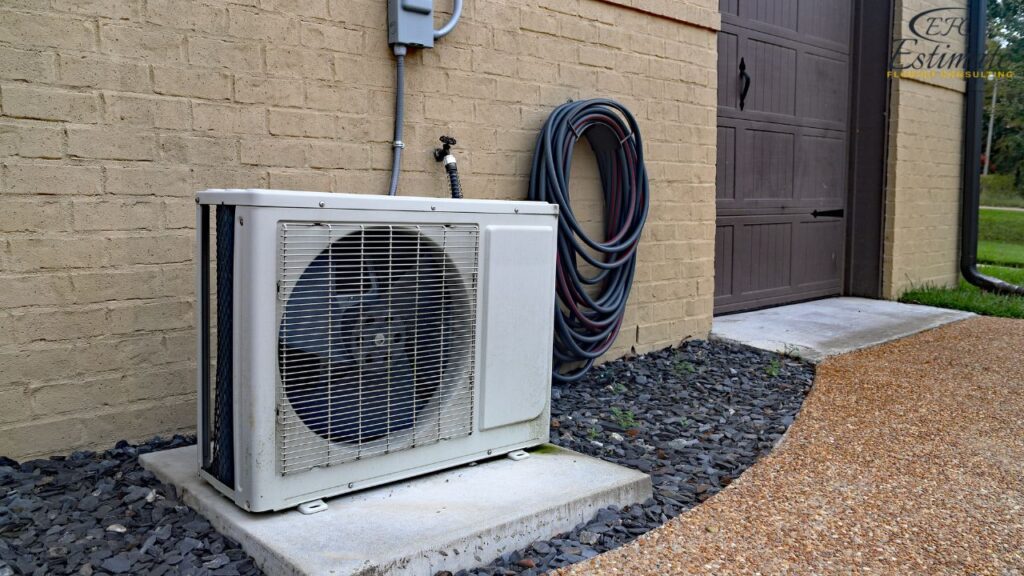
Hybrid Heat Pump System:
Hybrid heat pump systems combine the efficiency of a heat pump with the reliability of a furnace, providing both heating and cooling. These systems typically cost between $6,000 and $15,000, depending on the size and complexity of the system. Hybrid systems automatically switch between the heat pump and the furnace depending on the outdoor temperature, optimizing energy use and reducing utility costs. They are particularly beneficial in regions with moderate climates, where a heat pump can handle most of the heating needs without relying on the furnace.
Size of the Property: Calculating the Required Capacity
The size of your property is a critical factor in determining the cost of a new HVAC system. The larger the property, the more powerful the system needs to be to effectively heat and cool the space. HVAC systems are typically rated by their capacity, measured in BTUs (British Thermal Units) or tons, with larger homes requiring higher-capacity systems. The cost of the system increases with its capacity, so it’s important to choose the right size for your property to ensure optimal performance and energy efficiency.
Property Size (Sq.Ft.) | Required Capacity (Tons) | Estimated Cost |
Up to 1,000 Sq.Ft. | 1.5 – 2 Tons | $3,000 – $7,000 |
1,000 – 2,000 Sq.Ft. | 2 – 3 Tons | $4,500 – $10,000 |
2,000 – 3,000 Sq.Ft. | 3 – 4 Tons | $6,000 – $12,000 |
3,000 – 4,000 Sq.Ft. | 4 – 5 Tons | $7,500 – $15,000 |
Choosing the right capacity is essential for ensuring that your HVAC system operates efficiently. An undersized system will struggle to maintain comfortable temperatures, leading to higher energy bills and increased wear and tear. On the other hand, an oversized system will cycle on and off too frequently, which can also lead to higher energy costs and reduced comfort. Consulting with an HVAC professional to calculate the required capacity based on your property size, insulation, and climate will help you select the right system for your needs.
Labor Costs: Professional Installation vs. DIY
Labor costs are another significant factor in the overall expense of installing a new HVAC system. Professional installation is highly recommended for HVAC systems due to the complexity of the work and the need for proper handling of refrigerants and electrical components.
The cost of professional installation typically ranges from $1,000 to $5,000, depending on the complexity of the installation, the type of system, and your location.
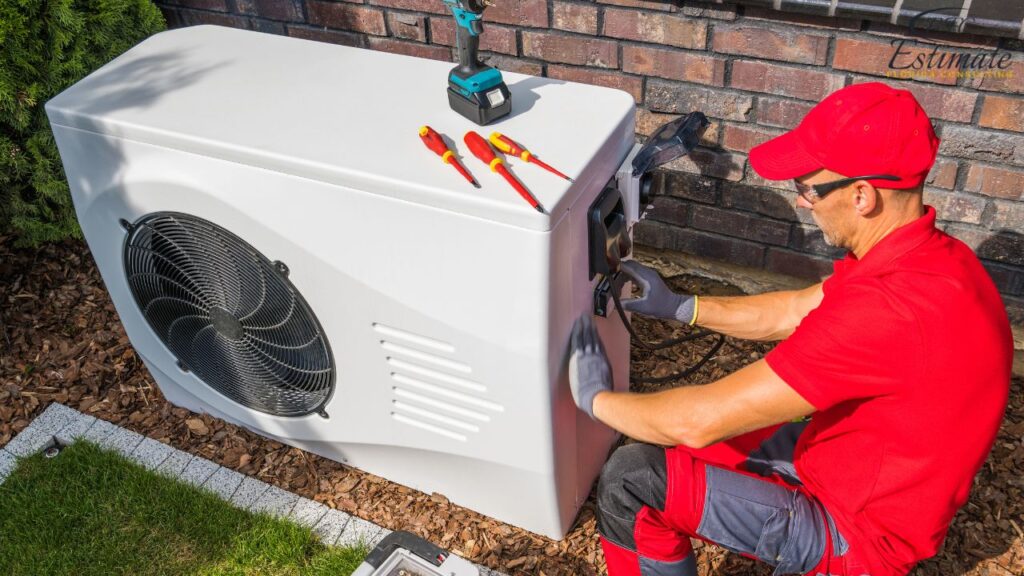
Installation Type | Average Cost |
Professional Installation | $1,000 – $5,000 |
DIY (Materials Only) | Varies (Not Recommended) |
Professional Installation:
Hiring licensed HVAC contractors ensures that your system is installed correctly, safely, and in compliance with local building codes. Professional installers have the expertise to handle all aspects of the installation, including ductwork, electrical connections, and refrigerant handling. While professional installation adds to the overall cost, it provides peace of mind and helps avoid potential issues down the line, such as system malfunctions or reduced efficiency.
DIY Installation:
While it may be tempting to save on labor costs by attempting a DIY installation, this is generally not recommended for HVAC systems. The installation process involves complex tasks that require specialized knowledge and tools, including sizing the system, connecting refrigerant lines, and ensuring proper airflow. Improper installation can lead to safety hazards, reduced system performance, and voided warranties. For these reasons, it’s best to leave HVAC installation to the professionals.
Additional Costs: Ductwork, Thermostats, and Upgrades
Beyond the cost of the HVAC system and labor, there are additional expenses to consider, such as ductwork, thermostats, and system upgrades. These costs can vary depending on the specifics of your project and the features you want to include.
Ductwork Costs:
If your property requires new ductwork or repairs to existing ducts, this can add significantly to the overall cost. Ductwork installation typically costs between $2,000 and $6,000, depending on the size of the property and the complexity of the duct system. Properly installed ductwork is essential for ensuring efficient airflow and maintaining the desired temperature throughout your property.
Thermostat Costs:
Modern HVAC systems often include smart thermostats that allow for precise control of your indoor climate. Smart thermostats typically cost between $150 and $500, depending on the features and brand. These thermostats can be programmed to optimize energy use, provide remote access via smartphone apps, and integrate with other smart home devices. Upgrading to a smart thermostat can enhance the efficiency of your HVAC system and provide greater convenience.
System Upgrades:
Additional upgrades, such as air purifiers, humidifiers, or zoning systems, can further improve the performance and comfort of your HVAC system. These upgrades typically cost between $500 and $3,000, depending on the type and complexity of the upgrade. While these features add to the initial cost, they can provide significant benefits in terms of air quality, energy efficiency, and overall comfort.
Download Template For New HVAC System Project Breakdown
- Materials list updated to the zip code
- Fast delivery
- Data base of general contractors and sub-contractors
- Local estimators

Types of HVAC Systems and Their Costs
Central Air Conditioning Systems: Efficient Cooling for Large Spaces
Central air conditioning systems are designed to cool large spaces by distributing conditioned air through a network of ducts. These systems are commonly used in residential and commercial properties and are known for their efficiency and ability to maintain consistent temperatures throughout a building. Costs for central air conditioning systems generally range from $5,000 to $12,000, depending on the size of the system and the complexity of the installation. Estimate Florida Consulting provides estimate services that include central air conditioning systems, ensuring your property benefits from efficient and reliable cooling.
Heat Pump Systems: Versatile Heating and Cooling
Heat pump systems provide both heating and cooling by transferring heat between the indoor and outdoor environments. These systems are energy-efficient and can be used in a variety of climates. Costs for heat pump systems typically range from $7,000 to $15,000, depending on the type and size of the system. Estimate Florida Consulting provides estimate services that include heat pump systems, offering a versatile and energy-efficient solution for your heating and cooling needs.
Ductless Mini-Split Systems: Flexible and Space-Saving
Ductless mini-split systems consist of an outdoor compressor and one or more indoor air-handling units, allowing for individual temperature control in different areas of a building. These systems are ideal for properties without existing ductwork or for adding climate control to specific rooms. Costs for ductless mini-split systems generally range from $4,000 to $10,000, depending on the number of indoor units and the complexity of the installation. Estimate Florida Consulting provides estimate services that include ductless mini-split systems, ensuring a flexible and efficient solution for your property.
HVAC System Cost Estimation
Accurate cost estimation is essential for the success of any HVAC system installation. It helps prevent unexpected expenses that could disrupt your budget and timeline, ensuring that your project stays on track from start to finish. Misestimating the equipment size, installation complexity, or labor costs can lead to significant cost overruns and delays, which can negatively impact the overall success of the project. A precise estimate allows you to manage your resources more effectively, ensuring that the right equipment and labor are available when needed. Estimate Florida Consulting provides accurate estimate services that deliver the precision needed to keep your project on budget and on schedule, ensuring that it meets the highest standards of quality and performance.
HVAC System Cost Calculator:
To assist you in planning and budgeting your HVAC system installation more accurately, Estimate Florida Consulting provides estimate services that include a comprehensive cost calculator. This tool allows you to input specific details about your project, such as the type of HVAC system, the total area to be covered, and the complexity of the installation. The calculator then provides an estimated cost range tailored to your project’s specific needs, offering you a clear understanding of what to expect financially. This cost calculator is an invaluable resource that helps ensure your project plans align with your budget, allowing you to allocate the necessary financial resources effectively.
Why Choose a New HVAC System?
Enhanced Comfort:
A new HVAC system ensures that your property maintains optimal indoor temperatures year-round, regardless of external weather conditions. Modern systems offer precise temperature control, improved humidity regulation, and better air quality, enhancing the overall comfort of your living or working environment. Estimate Florida Consulting provides estimate services that help you select the best HVAC system for your needs, ensuring consistent comfort and satisfaction.
Energy Efficiency:
In addition to enhancing comfort, a new HVAC system can significantly improve energy efficiency, reducing utility costs and minimizing your environmental impact. Advanced HVAC systems are designed to use energy more efficiently, providing the same level of heating and cooling with less energy consumption. Estimate Florida Consulting provides estimate services that help you choose energy-efficient systems, allowing you to enjoy lower utility bills and a reduced carbon footprint.
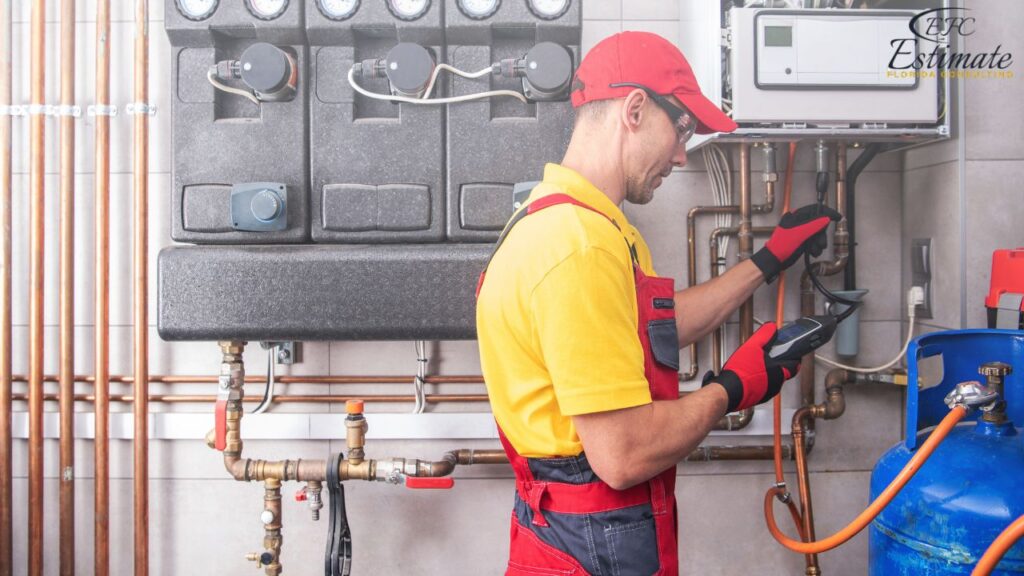
Long-Term Benefits of Investing in a New HVAC System
Investing in a new HVAC system offers numerous long-term benefits, from improved energy efficiency and reduced utility bills to enhanced comfort and better air quality. By choosing the right system and ensuring proper installation, you can enjoy a comfortable, efficient, and healthy indoor environment for years to come.
Energy Savings:
Modern HVAC systems are designed to maximize energy efficiency, which can lead to significant savings on your utility bills. Features such as variable speed motors, smart thermostats, and zoning systems allow you to optimize energy use, reducing waste and lowering your overall energy costs. Over time, the energy savings can offset the initial investment in a new HVAC system, making it a cost-effective choice for your home or business.
Increased Property Value:
A new, energy-efficient HVAC system can enhance the value of your property, making it more attractive to potential buyers. Homes and businesses with modern HVAC systems are often seen as more desirable, as they offer improved comfort, lower energy costs, and better air quality. Whether you’re planning to sell your property in the near future or simply want to increase its market appeal, investing in a new HVAC system can be a smart move.
Conclusion
Investing in a new HVAC system is a crucial decision for enhancing comfort, energy efficiency, and indoor air quality in your property. With costs ranging from $5,000 to $20,000 depending on the system type and property size, it’s essential to plan and budget effectively. Estimate Florida Consulting offers expert cost estimator services to ensure your project stays within budget while delivering optimal performance. By choosing the right system and securing accurate estimates, you can enjoy a comfortable and energy-efficient environment, reducing utility costs and increasing property value for years to come.
FAQs
A new HVAC (Heating, Ventilation, and Air Conditioning) system is essential for maintaining comfortable indoor temperatures, improving air quality, and enhancing energy efficiency in residential, commercial, or industrial properties. Investing in a new HVAC system can significantly impact your property’s comfort and reduce utility costs.
The cost of a new HVAC system varies widely, typically ranging from $5,000 to $20,000. This includes equipment and installation. The exact cost depends on factors such as the type of system, property size, installation complexity, and specific features chosen.
Several factors influence the cost, including the type of HVAC system (e.g., central AC, heat pump, ductless mini-split), property size, installation complexity, and additional features like zoning systems or smart thermostats. Understanding these factors helps in effective budgeting.
HVAC system costs vary based on property size:
- 1,000 sq ft: $5,000 – $15,000
- 2,500 sq ft: $15,000 – $40,000
- 5,000 sq ft: $35,000 – $90,000
- 10,000 sq ft: $80,000 – $200,000
Different HVAC systems come with varying costs:
- Central AC: $5,000 – $9,000 installed
- Heat Pump: $6,500 – $12,000 installed
- Ductless Mini-Split: $4,000 – $8,500 installed
- Furnace: $4,000 – $10,000 installed
- Boiler: $6,000 – $12,000 installed
- Geothermal Heat Pump: $15,000 – $40,000 installed
Additional costs include:
- Ductwork Installation/Repair: $3,000 – $8,000
- Thermostat Installation: $200 – $800
- Energy Efficiency Upgrades: $1,000 – $5,000
- Permits and Inspection Fees: $200 – $1,500
- Zoning Systems: $2,000 – $5,000
Estimate Florida Consulting offers a cost calculator that allows you to input project specifics, such as system type and property size, to receive an estimated cost range. This helps in effective planning and budgeting for your HVAC system installation.
A new HVAC system enhances comfort, improves energy efficiency, and offers better indoor air quality. It also reduces utility costs and can increase your property’s market value, making it a wise long-term investment.
Long-term benefits include:
- Energy Savings: Lower utility bills due to improved efficiency
- Increased Property Value: More attractive to potential buyers
- Enhanced Comfort: Better temperature and humidity control
Estimate Florida Consulting provides expert cost estimation services to help you plan and execute your HVAC system installation. We ensure your project stays within budget while delivering optimal performance and efficiency. Contact us to get started on your HVAC system cost estimation.
Google Reviews



Process To Get New HVAC System Cost Estimate Report
Here I am going to share some steps to get new HVAC system estimate report.
-
You need to send your plan to us.
You can send us your plan on info@estimatorflorida.com
-
You receive a quote for your project.
Before starting your project, we send you a quote for your service. That quote will have detailed information about your project. Here you will get information about the size, difficulty, complexity and bid date when determining pricing.
-
Get Estimate Report
Our team will takeoff and estimate your project. When we deliver you’ll receive a PDF and an Excel file of your estimate. We can also offer construction lead generation services for the jobs you’d like to pursue further.

